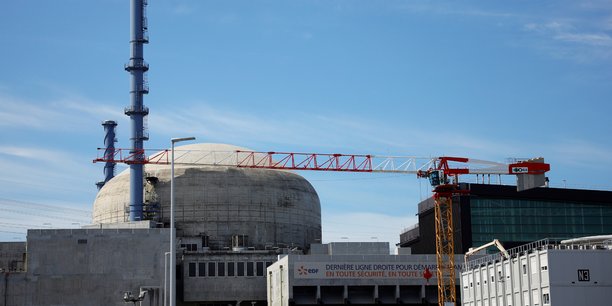It will be an event. After twelve years of delay and a bill that quadrupled compared to the initial budget, at 13.2 billion euros, the Flamanville EPR nuclear reactor will inject electricity into the French network for the first time “at summer 2024 », indicated this Wednesday EDF and not “ mid-2024 » as expected so far. This slight shift in the date of “ coupling » comes in the wake of Tuesday’s announcement by the Nuclear Safety Authority (ASN, nuclear watchdog) according to which fuel loading was postponed to mid-April at best instead of March 31 as initially planned by the electrician group.
“In the coming days, ASN will launch the consultation on the draft commissioning decision, that is to say, we will submit it to public comments for at least 15 days (…) or even 3 weeks, and at the end the ASN will take the commissioning decision,” explained the safety authority to AFP, confirming information from Les Echos.
This consultation at the end of which the ASN will issue its commissioning opinion, taking into account or not the comments of the public, is the epilogue of a river construction site, 17 years after the launch of the construction of the Normandy EPR, marked by numerous cost and schedule slippages.
“After loading the reactor with nuclear fuel, start-up operations will continue, including checks of all safety-related systems, tests and qualifications of equipment carried out throughout the rise in temperature and pressure of the reactor. boiler, then during the rise in power of the reactor. At 25% power, the production unit will be connected to the national electricity network,” detailed EDF in December 2022.
For the Minister of Industry Roland Lescure, we are “not not within two weeks “.
As a reminder, driven by a renewed interest in the atom, EDF intends to deploy 3rd generation reactors (EPR) in France and Europe on a scale ” industrial ”, with an objective now of “ two per year », compared to one or two per decade currently. The challenge is ambitious given the repeated cost and delay slippages, embodied by the Flamanville EPR. The industrial challenge is colossal for the group, weighed down by an abysmal debt – 54.4 billion euros – and criticized for the setbacks of its EPR projects. Especially since EDF must also respond to the relaunch of a nuclear program in France of up to 18 EPR2 reactors – an improved version of the EPR – and carry out its two English programs, Hinkley Point, whose delay could wait six years, and Sizewell. In France, the government is carrying out a program for six new EPR reactors, estimated at 51.7 billion euros.
Funding
This announcement comes at a time when the issue of new nuclear power plants, the general director of the Caisse des Dépôts (CDC), Eric Lombard, indicated that it would be “logical” to finance new nuclear power plants with the savings that the French invest. on their Livret A. “Because it is an important element of the decarbonization of our economy,” he added during his passenger on Ecorama broadcast on the Boursorama site.
“If we finance, for example, a third of the nuclear program, it will represent a few billion euros per year (…), it is something which is entirely absorbable by the savings of the French,” continued Eric Lombard. , recalling that his “first priority” remained social housing.
The sums deposited in Livrets A and Livrets de développement durable et solidaire (LDDS) are 59.5% managed by the Caisse des Dépôts, and intended mainly to finance social housing. The remaining 40.5% is managed by banks, and must be mainly dedicated to bank loans to SMEs. These two savings accounts attracted nearly 40 billion euros in deposits last year and totaled 571.5 billion in outstandings at the end of February. The general director also mentioned the role of the “Caisse” in financing armaments, via its role as shareholder “ large companies which have an arms dimension in their activity “.
“ We probably need to go further, particularly to finance the industrial fabric of SMEs and mid-sized companies. », he added, referring to the role of banks, institutional investors or even insurance companies and not that of regulated savings in this area.
The direction of Livret A towards the defense industry, desired by the Senate, is not favored by Bercy either, but on February 23 the Minister of the Economy Bruno Le Maire launched the idea of creating a European savings product responsible, among other things, for “ finance our defense effort “.
Eric Lombard also affirmed that this industry was “ completely compliant » with environmental, societal or governance (ESG) criteria, “ since we clearly see that national defense is also the defense of our democracy and our environmental trajectory “.

